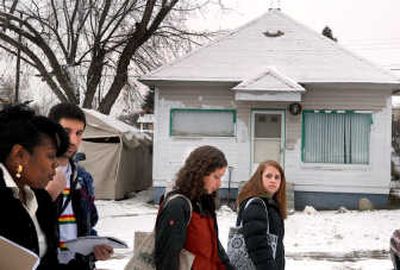Students learning philanthropy

It’s not uncommon for colleges to emphasize service as part of their education.
But a new program at Whitworth University will put students into the role of philanthropists – overseeing a $15,000 charity fund, investigating community needs, reviewing grant applications and deciding where the money goes.
“It’s not an approach I’ve really heard of before,” said Glen Guenther, a junior from Idaho Falls. “This is going to be practical experience in grant-writing and assessing specific proposals.”
The school was picked as one of five nationally to participate in the Students4Giving program, funded by a charitable arm of Fidelity, the big mutual fund and investment company.
Whitworth’s selection was announced Thursday, and students had already begun working on the project before noon, visiting the West Central Community Center to begin “asset-mapping” the needs and resources in the neighborhood. The project will expand on current partnerships between the college and West Central neighborhood officials.
“Our job was to continue looking around the neighborhood and start identifying areas that need help, and resources West Central already has,” said Amy Johnson, a senior from Portland.
Fidelity’s Charitable Gift Fund is providing a $15,000 donor-advised fund to each of five colleges to help foster the next generation of philanthropic activity. Students will create a system for accepting and evaluating proposals, and recommend which are funded.
Whitworth, a private university affiliated with the Presbyterian Church, has a strong tradition and theme of service-oriented learning, and the announcement of the new philanthropy project is a natural extension of that, school officials said.
“What this does is add another dimension to our giving and to our involvement with the community,” said Rhosetta Rhodes, director for service learning and community engagement at the school.
Rhodes said that further fundraising is also part of the project, with a goal of creating a fund that awards grants annually. Students involved in the existing Bonner Leaders program will participate in the new program, which will be linked to courses during the school’s January term and in the spring.
Whitworth President Bill Robinson said the program is a good fit for the school.
“As a Christian institution, we need to help our student develop a ‘first fruits’ mentality,” he said in a news release. “Giving should be our first expenditure, not what we do with what’s left over. If we claim to be Christ-centered, then philanthropy should be at the center of our personal budgets.”
Thirty-five schools applied for the five spots. Besides Whitworth, the schools picked were Boston University, Cal State-Fresno, Portland Community College, and the University of North Carolina at Chapel Hill.
Johnson said that once students are through “asset-mapping” West Central, they’ll have a better idea how well the resources meet the needs there. The program will look to identify gaps for grant funding, starting with a loose goal of providing 10 grants – though that detail, like virtually everything involved, is subject to change.
In addition to the focus on philanthropy, the new project will help bring together different parts of the university, she said.
“It’s going to open up a more holistic approach that Whitworth is starting to grow toward, where more students from more disciplines will be involved,” she said.
Guenther, who lives in the West Central neighborhood, said he likes the program because it’s a “humble” effort to collaborate with neighbors rather than trying to apply a solution from the outside.
“We’re not going in there to ‘fix’ something,” he said, “but to establish a relationship and express our solidarity with them.”